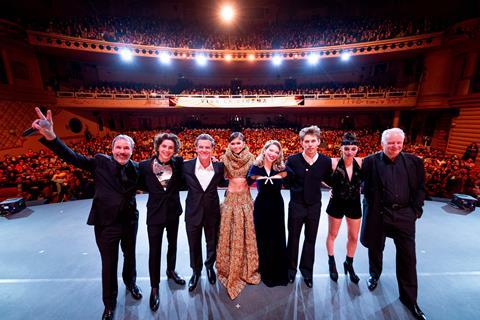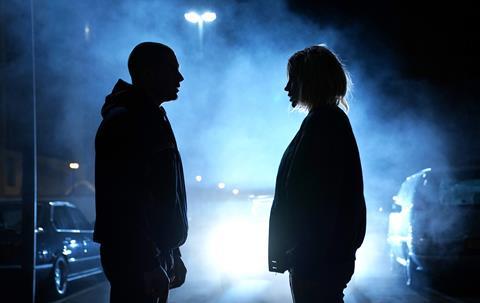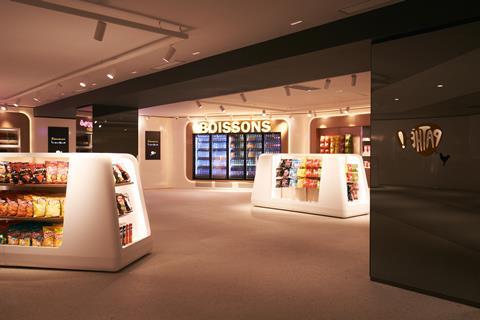After a strong pandemic recovery, France is facing a challenging 2024 at the box office. But the sector continues its push to turn films into events with splashy premieres, creative campaigns and improved cinema experiences.

Last year was a promising one for France’s exhibitors and distributors as audiences returned to cinemas, lured by overachievers from abroad including The Super Mario Bros. Movie, Barbie and Oppenheimer, and hometown heroes Asterix & Obelix: The Middle Kingdom, Alibi.com 2 and the two-part The Three Musketeers. France’s box office totalled 181 million ticket sales in 2023, a rise of 18.9% on 2022’s 152 million admissions and a total box‑office gross estimated to be €1.3bn ($1.4bn) based on an average ticket price of €7.20 ($7.80).
While still 13.1% below the pre-Covid 2017-19 average, the French box office resisted the aftershocks of the pandemic better than any other European territory last year, including Germany (-16.9%), Spain (-23.9%), the UK and Ireland (-22.1%) and Italy (-21.8%), and fared better than the US (-21.6%).
“Other countries are more dependent on American cinema than France,” argues Olivier Snanoudj, Warner Bros Discovery head of theatrical distribution for France and Benelux. “When the offer of US titles is weaker, French films make up for the gap. Our French system is often criticised but it is performant.” Just 81 US films were released in France in 2023, compared to an average of 127 per year in pre-pandemic 2017‑19.
This year has started off slowly, with the local box office falling 11% during the first 10 weeks of 2024, according to Comscore data. The decline is due to a dearth of Hollywood blockbusters in the wake of the 2023 writers and actors strikes, no dominant French titles to fuel the fire like last year’s Asterix & Obelix: The Middle Kingdom (4.6 million admissions) and Alibi.com 2 (4.3 million), and no equivalent to Avatar: The Way Of Water, which sold 4 million tickets in January alone during its 14.2 million sweep.
US offerings such as Dune: Part Two (3.3 million admissions at press time), Bob Marley: One Love(1.8 million), and local comedies Cocorico (1.9 million) and Oldies But Goodies (1.5 million) are holding their own, but the outlook is bleak until summer with few surefire local-language or US blockbusters on the calendar. “Our challenge in the short term is to get through the first half of the year before we can get back to a stable level of moviegoing by 2025,” says Marc-Olivier Sebbag, executive director of France’s National Cinema Federation (FNCF).
Starting at the end of June with local epic The Count Of Monte-Cristo, a steadier stream of potential hits will arrive in number from overseas, including Beetlejuice Beetlejuice, Joker: Folie À Deux, Gladiator 2, Wicked and Twisters, plus anticipated local-language fare such as And Their Children After Them, Monsieur Aznavour and Beating Hearts. “It’s going to be a very strange year,” says Sebbag of the uneven breakdown.

Comscore France general manager Eric Marti believes that, while low compared to last year, January and February figures “are not irremediable” and estimates the total tally for 2024 will be in the 175‑180 million admissions range.
While the Olympic Games in Paris (July 26-August 11) could distract from what is peak summer blockbuster season, distributors and exhibitors are not worried the event will put a major dent in moviegoing. Comscore recently conducted a study on how host countries’ cinemas fared during the London 2012, Rio 2016 and Tokyo 2021 summer Olympics. “We didn’t see a complete box-office collapse,” says Marti. “There was, of course, an impact but it wasn’t colossal.”
As for the year ahead, Snanoudj, like much of the French exhibition industry, remains optimistic. “[This year] is more challenging on paper, but we said the same thing last year and we never imagined the success of Barbie. There are always surprises.”
One factor that could shake up France’s exhibition landscape would be the long-rumoured sale of CGR Cinemas, the second-largest exhibitor in the country after Pathé. A sale of the family-owned business — estimated to be worth around $1bn in 2022 when it first hit the market — would shake up the theatrical distribution sector in the territory, but the group has since revamped its leadership team and, according to industry insiders, talks to sell have been shelved for the time being.
Hit the road
The French word événementialiser means to turn something into an event, a strategy increasingly deployed by distributors in the territory. “There are more tours, more premieres. Audiences love it,” says Snanoudj. Such events include star-studded Paris premieres and multi-city tours, such as the one undertaken by Éric Toledano and Olivier Nakache’s A Difficult Year, which saw the filmmakers travel to 140 different venues in France, and Mélanie Auffret’s small village-set Sweet Little Things, which nascent French distributor Zinc took to 100 tiny towns all over France for bespoke premieres. Both films ended up selling nearly 1 million tickets and were among the top French titles of the year.
Distributor Diaphana invited cinemagoers named Yannick to see Quentin Dupieux’s film Yannick for free in local cinemas during its first week. The film remains the French master of the absurd’s most successful in France to date, with 464,000 paid admissions. “Eventising films is the key to our strategy,” says Snanoudj. “We need to give people a specific reason to see each and every film. It’s not just about a cast or director. It’s, ‘Why will I leave home and pay to see this film?’ Because it’s an event.”
Warner Bros hosted a glitzy local premiere in Paris for Dune: Part Two, with the film’s director Denis Villeneuve and stars Timothée Chalamet, Zendaya and Austin Butler in tow. “Eventising films and working with influencers is essential today,” says Murielle Monclair, founder of Paris-based event marketing agency Cartel, which brought 120 influencers and content creators to the premiere, complete with a fan zone and TV line for local media and content creators; the digital campaign reached 76.1 million users. The film is France’s strongest opener of the year with 1.1 million admissions in its first five days, and the territory’s highest grosser of 2024 to date. Just over a third (34%) of the audience was in the under-25 age category.
“We follow trends on TikTok and always look for opportunities to convert them into film promotion to create organic campaigns as much as possible,” says Monclair. Cartel partnered with Formula 1 racing driver Pierre Gasly for tailored content around the release of The Flash, which reached more than 10 million people. It also sent super-influencer Lena Mahfouf, who boasts 5 million followers on Instagram, to the Los Angeles premiere of Barbie, putting a French spin on a global campaign.
Even once-hesitant local studios such as SND, Gaumont and Universal France are increasingly willing to pay up and lure such audiences in the younger age range, a key cinema target demographic. “Our budget hasn’t changed, but the way we partition it has,” explains Snanoudj. “Ten — even five — years ago, we didn’t spend what we do now in digital marketing.”
Such digital marketing is especially effective as it coincides with a major push into a hybrid physical and online moviegoing experience among exhibitors. “We keep asking what else can we do to make the complete experience as seamless as possible for audiences, from the time they book their tickets online at home until after they leave the cinemas,” says Aurélien Bosc, chairman of France’s leading exhibitor Pathé Cinémas.
France was relatively slow to adopt online ticketing, but 80% of moviegoers at Pathé Cinémas now purchase their tickets online, and CGR Cinemas, UGC and mk2 also offer the option. Thanks to advanced ticketing, “we can use the space at our venues for recreational activities instead of queuing,” says Bosc. Following trends already seen in other markets, online ticketing also allows distributors and exhibitors to join forces for more targeted marketing. “It’s a gamechanger,” says Bosc. “We can look at their accounts and study what they like from film genres to specific talent and take a more active role in the promotion of the films in partnership with the distributors.”
Film ‘labels’ are increasingly important: Pathé employs different badges such as ‘coup de coeur’ for a standout title or ‘l’autre regard’ for recommended arthouse films, while mk2 adds a ‘we saw it, we liked it’ label to select titles. “Editorialisation is so important to help films stand out among the avalanche of images and releases,” says Pathé’s Bosc. UGC has its own signature honours, including staff picks, moviegoers’ favourites, arthouse discovery titles and a ‘UGC frissonne’ label for genre and horror films. An ‘excellence’ label is given to movie theatres that meet requirements of comfort, sound and standards, awarded by the Higher Technical Commission for Sound and Images (CST) crew members association.
Other nationwide initiatives to generate enthusiasm for moviegoing include the summer event Fête du Cinéma and the three-day Le Printemps du Cinéma in the spring, when tickets cost just €5 ($5.45).
France is also known for its movie passes, currently offered by Pathé and UGC-mk2, which allow cardholders to pay a monthly fee in return for unlimited film screenings and other perks such as reduced prices on concessions and exclusive access to special screenings and events.
The passes keep moviegoers heading to theatres, particularly in periods of box-office lulls to keep admissions up. Bosc calls the scheme “a diversity machine that allows us to feed an ecosystem of creation where people will see smaller films they may not otherwise have taken the risk to pay to see”.
Premium approach

Whether opting for blockbusters or arthouse fare, “people want comfort”, says Bosc. “The first tickets sold for blockbusters are always the most expensive premium seats,” as audiences opt to see such films in Imax, Dolby Cinema or 4DX. For example, 40% of tickets sold for Dune: Part Two in its first week were for premium seats and screens. “People are willing to pay more for an immersive cinema experience,” agrees Marti. “Even independent cinemas can invest in more comfort and better services.”
Pathé, which currently operates 128 sites across its international portfolio, has led the charge and is continuously renovating its existing locations. It has partnered with renowned designers such as Ora‑Ïto to improve its presentation, and international architects including Renzo Piano on its Pathé Palace project. That Paris venue is set to reopen later this year, with premium offerings such as spacious seating, Dolby Atmos and Dolby Vision technologies, LED screens, cocktail bar, onsite cafés and co-working spaces. Bosc says the premium concept is part of the group’s global strategy “that people will go to cinemas if there are good movies, but also if movie theatres meet high standards and are attractive”.
Many theatres unable to keep up with increasingly discerning French audiences have been forced to shut their doors — for example, on Paris’s famed Champs-Elysées where the Pathé group-owned Gaumont Marignan, UGC George V and Gaumont Ambassade have all closed in recent years. UGC is rumoured to be mulling a definitive closure of its UGC Normandie, the last standing multiplex on the boulevard, as moviegoers opt for more central and popular neighbourhoods, and ’plexes with modern amenities such as UGC-Ciné Cité Les Halles and mk2 Bibliothèque. New Paris cinemas on the horizon include the famed arthouse theatre La Pagode, due to reopen in 2025, Bac Films’ Le Tapis Rouge cinema in central Paris and Pathé’s La Géode complete with dual Imax Sphere projection.
Some of the nationwide modernisation is a government mandate, part of a wider European initiative among major theatres to reduce carbon emissions to net zero by 2030. In addition to xenon being replaced by laser projectors, boosting image quality and consuming less energy, FNCF proposed an energy-saving charter for cinemas in 2022 that included turning off lights, lowering heating, ventilation and air conditioning whenever possible, and adapting hours of operation to when there are more moviegoers. The less-is-more approach is both eco-friendly and alluring for audiences.
Pathé renovated its Pathé Parnasse by halving the number of seats, creating more space and improved amenities. “We don’t mind reducing the capacity if it means making the experience better for audiences,” says Bosc. “There’s no logic in filling half a theatre when we can fill a whole one where everyone is comfortable.” Improvements include spacious flannel-lined seats, laser projection, better sound quality and cleaner theatres. Bosc says such comfort and progression to a more “haut de gamme” (high-end) experience is “vital for the future of theatres”.
It is simple for Bosc: “A film needs to be good and seen in the best conditions possible. People go to the cinema because they want to, so it is up to us to give them a reason to want to.”
Read more:
-
How continental exhibitors are getting creative to boost audiences
-
Italy’s exhibitor association CEO on the country’s cinema landscape
-
How Spain’s Cine Seniors scheme is luring back older audiences
-
Yorck Cinema Group head Christian Brauer on Germany’s arthouse recovery
-
How Denmark’s Cinema Club is boosting arthouse releases







![The Brightest SunScreen[Courtesy HKIFF]](https://d1nslcd7m2225b.cloudfront.net/Pictures/274x183/3/5/0/1448350_thebrightestsunscreencourtesyhkiff_312678.jpg)

















No comments yet